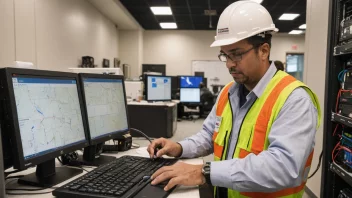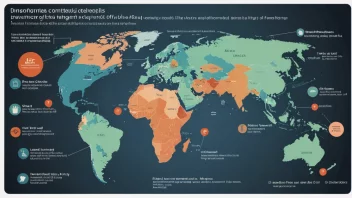The concept of smart cities has rapidly evolved over the past decade, driven by advancements in technology and an increasing need for sustainable urban development. As urban populations continue to swell, cities must find innovative ways to manage resources, enhance the quality of life for residents, and reduce their environmental impact. This article delves into the future of smart cities, examining the engineering solutions that are paving the way for more efficient, connected, and livable urban environments.
Understanding Smart Cities
Smart cities utilize digital technology to enhance performance, efficiency, and the quality of urban services. The integration of the Internet of Things (IoT), big data analytics, and artificial intelligence (AI) allows for real-time monitoring and management of city services, from traffic flow to energy consumption. The goal is to create urban environments that are not only technologically advanced but also sustainable and resilient.
Key Characteristics of Smart Cities
- Connectivity: Smart cities rely on interconnected systems that facilitate communication between devices, infrastructure, and citizens.
- Sustainability: Emphasis on reducing carbon footprints through renewable energy sources, efficient waste management, and sustainable transportation options.
- Data-Driven Decision Making: The use of data analytics to inform policy decisions, optimize resource allocation, and enhance public services.
- Citizen Engagement: Involving residents in the decision-making process through digital platforms and feedback mechanisms.
Engineering Solutions for Smart Cities
Engineering plays a crucial role in the development of smart cities. Innovative solutions are being implemented in various sectors, including transportation, energy, and waste management, to create more efficient urban environments.
Transportation Innovations
One of the most significant challenges faced by urban areas is traffic congestion. Engineering solutions such as smart traffic management systems and autonomous vehicles are being developed to alleviate these issues.
Smart Traffic Management Systems
These systems use sensors and cameras to monitor traffic conditions in real-time. By analyzing data, they can adjust traffic signals, optimize traffic flow, and provide drivers with real-time information on congestion and alternative routes. Cities like Los Angeles and Singapore are already implementing these systems with promising results.
Autonomous Vehicles
The rise of autonomous vehicles (AVs) presents an exciting opportunity for smart cities. AVs can reduce the need for parking spaces, decrease traffic accidents, and improve transportation efficiency. Cities are exploring dedicated lanes for AVs, integrated public transport systems, and the necessary infrastructure to support this technology.
Energy Efficiency and Sustainability
Energy consumption is a major contributor to urban carbon emissions. Engineering solutions aimed at enhancing energy efficiency are critical for smart cities.
Smart Grids
Smart grids integrate digital technology into the electricity supply network, enabling better management of energy resources. They allow for real-time monitoring of energy use, demand response capabilities, and the integration of renewable energy sources. By optimizing energy distribution, smart grids can significantly reduce waste and improve reliability.
Green Building Technologies
Architectural innovations such as green roofs, energy-efficient HVAC systems, and sustainable materials are becoming standard in new constructions. These technologies not only reduce energy consumption but also improve air quality and enhance urban biodiversity.
Waste Management Solutions
Effective waste management is essential for maintaining clean and healthy urban environments. Engineering solutions are emerging to tackle this challenge through smart waste management systems.
Smart Waste Bins
Equipped with sensors, smart waste bins can monitor fill levels and optimize collection routes for waste management trucks. This not only reduces operational costs but also minimizes the carbon footprint associated with waste collection.
Recycling and Upcycling Initiatives
Innovative technologies are being developed to enhance recycling processes and promote upcycling. For example, AI-powered sorting systems can improve the efficiency of recycling facilities, ensuring that more materials are diverted from landfills.
The Role of Data and Connectivity
Data is the backbone of smart city initiatives. The ability to collect, analyze, and act on data is crucial for informed decision-making. However, this reliance on data also raises important questions about privacy and security.
Data Collection and Privacy Concerns
As cities deploy sensors and IoT devices to gather data on everything from traffic patterns to air quality, concerns about data privacy and security become paramount. Ensuring that data is collected and stored responsibly is essential to maintaining public trust.
Cybersecurity Challenges
With increased connectivity comes heightened risks of cyberattacks. Smart cities must invest in robust cybersecurity measures to protect critical infrastructure and sensitive data from malicious actors.
Case Studies: Successful Smart City Initiatives
Several cities around the world are leading the way in smart city development, providing valuable lessons for others to follow.
Barcelona, Spain
Barcelona has implemented a range of smart city initiatives, including a smart lighting system that adjusts brightness based on pedestrian activity. The city also utilizes a comprehensive IoT platform to manage services like waste collection and traffic management.
Singapore
Singapore's Smart Nation initiative aims to harness technology to improve urban living. The city-state has deployed a vast network of sensors to monitor traffic, air quality, and public health, allowing for data-driven decision-making.
The Future of Smart Cities
As technology continues to advance, the future of smart cities looks promising. Innovations in AI, machine learning, and sustainable engineering will drive further advancements in urban living.
Emerging Technologies
Technologies such as 5G connectivity, blockchain, and advanced AI are set to revolutionize how cities operate. For example, 5G networks will enable faster data transmission, enhancing the performance of smart city applications.
Collaboration and Community Engagement
Successful smart city initiatives require collaboration between government, private sector, and citizens. Engaging the community in the planning and implementation process ensures that solutions meet the needs of residents.
Conclusion
The future of smart cities is not just about technology; it is about creating sustainable, livable urban environments that enhance the quality of life for all residents. By leveraging engineering solutions and embracing data-driven decision-making, cities can tackle the challenges of urbanization and build a brighter future. As we look ahead, it is clear that the journey towards smarter cities is just beginning, and collaboration among stakeholders will be essential in shaping the urban landscapes of tomorrow.






